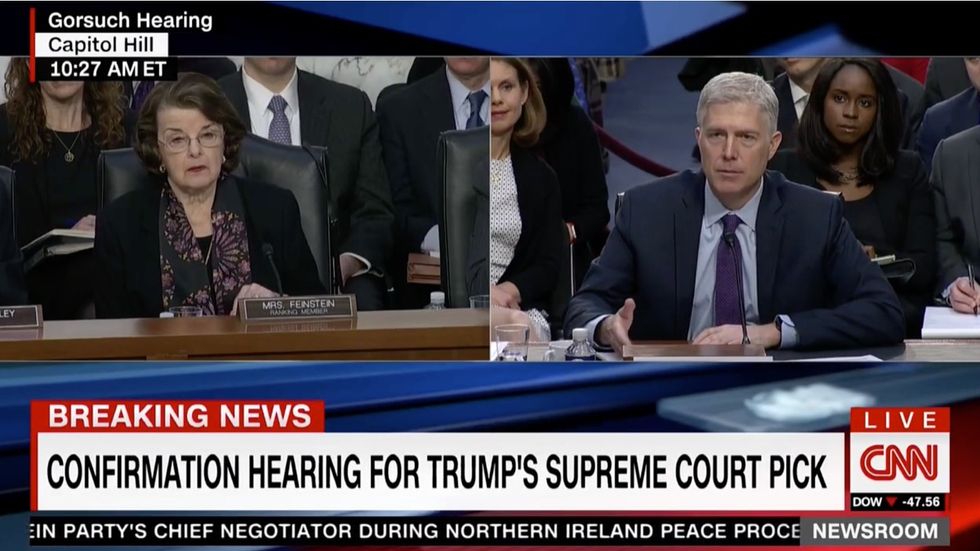
© 2024 Blaze Media LLC. All rights reserved.
It doesn’t matter what he personally believes about cases, Neil Gorsuch is here to examine what the law says, an amicable-yet-telling exchange before the judiciary committee Tuesday morning revealed.
In his Supreme Court confirmation hearing, Trump’s pick to replace Justice Antonin Scalia made his views very clear with the answers he didn’t give, more than the answers he did.
During her question, Sen. Dianne Feinstein, R-Calif., a ranking member of the committee, pressed the 10th Circuit Court jurist on one of the most consequential Second Amendment cases in recent history: D.C. v. Heller. But, if she was looking for a “gotcha” moment to paint Gorsuch as some kind of jurisprudential gun nut, she ended up coming away empty-handed.
[Transcript via C-SPAN closed captioning.]
Feinstein: In D.C. v. Heller, the majority opinion written by justice Scalia recognized that, and I'm quoting, of course, “the Second Amendment was not unlimited.”
Justice Scalia wrote, for example, laws restricting access to guns by the mentally ill or laws forbidding gun possession in schools were consistent with the limited nature of the Second Amendment. Justice Scalia also wrote that, quote, “weapons that are most useful in military service, M-16 rifles and the like, may be banned without infringing on the Second Amendment.” Do you agree with that statement that under the Second Amendment weapons that are most useful in military service, M-16 rifles and the like, may be banned?
Gorsuch: Senator, Heller makes clear the standard that we judges are supposed to apply. The question is whether it is a gun in common use for self-defense, and that may be subject to reasonable regulation. That's the test as I understand it. There is lots of ongoing litigation about which weapons qualify under those standards, and I can't prejudge that litigation.
Feinstein: I'm just asking you do you agree with the statement. Yes or no? […]
Gorsuch: Whatever is in Heller is the law. And I follow the law.
Feinstein: Do you agree?
Gorsuch: It is not a matter of disagreeing or disagreeing, senator, respectfully. It is a matter of it being the law. And my job is to apply and enforce the law.
Following a very long exchange with Committee Chairman Chuck Grassley, R-Iowa, about how a good judge evaluates precedent, Gorsuch repeatedly made clear that his personal opinions about cases would have no place during the rest of the hearing, even on contentious cases like Roe v. Wade.
SCOTUS nominee Neil Gorsuch: Roe v Wade "is a precedent of the United States Supreme Court. It has reaffirmed." https://t.co/bk3rqqihPE pic.twitter.com/FVPDdvfTwX
— Evan McMurry (@evanmcmurry) March 21, 2017
Elsewhere in the hearing, Neil Gorsuch stated his aversion to pre-judging cases in the hearing comes from a desire to assure future petitioners and litigants of his impartiality. But that still didn’t stop Dianne Feinstein from trying to get a read on his view on one of the Left’s biggest boogeyman cases, as well as a host of others.
Want to leave a tip?
We answer to you. Help keep our content free of advertisers and big tech censorship by leaving a tip today.
Want to join the conversation?
Already a subscriber?
more stories
Sign up for the Blaze newsletter
By signing up, you agree to our Privacy Policy and Terms of Use, and agree to receive content that may sometimes include advertisements. You may opt out at any time.
© 2024 Blaze Media LLC. All rights reserved.
Get the stories that matter most delivered directly to your inbox.
By signing up, you agree to our Privacy Policy and Terms of Use, and agree to receive content that may sometimes include advertisements. You may opt out at any time.



